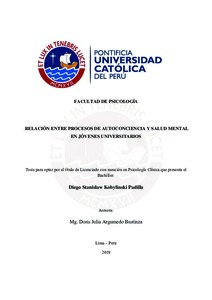| dc.contributor.advisor | Argumedo Bustinza, Doris Julia | |
| dc.contributor.author | Kobylinski Padilla, Diego Stanislaw | |
| dc.date.accessioned | 2020-01-22T20:53:29Z | |
| dc.date.available | 2020-01-22T20:53:29Z | |
| dc.date.created | 2019 | |
| dc.date.issued | 2020-01-22 | |
| dc.identifier.uri | http://hdl.handle.net/20.500.12404/15652 | |
| dc.description.abstract | El propósito del presente estudio fue analizar la relación entre los procesos de Autoconciencia y la
Salud Mental en jóvenes universitarios. La investigación se basa en el modelo de Mentalidad
Psicológica propuesto por Grant (2001) y el modelo de Salud Mental desarrollado por Veit y Ware
(1983). De modo específico, se exploró si existen diferencias en la Salud Mental según el sexo de los
participantes y si las correlaciones entre los procesos de Autoconciencia y la Salud Mental varían
según esta variable sociodemográfica. Para lograr dichos objetivos, se aplicaron dos instrumentos, la
Escala de Autorreflexión e Insight (SRIS) y el Inventario de Salud Mental (MHI), a un grupo de 313
estudiantes de entre 18 y 28 años (M =21.65; DE =1.90) estudiantes de una universidad privada en
Lima Metropolitana. Los resultados arrojaron diferencias en puntaje promedio para Lazos
Emocionales, Autorreflexión y sus subfactores, con mayores puntuaciones en el caso de las mujeres.
Insight mantiene relaciones directas con Bienestar Psicológico y sus subfactores, e indirectas con
Estrés Psicológico y sus subfactores. Se encontró una pequeña relación directa entre Compromiso
con la Autorreflexión y Depresión. En el caso de los hombres, se mantuvo la relación entre
Compromiso y Depresión, mientras que se diluyeron las relaciones entre los Procesos de
Autoconciencia. Por último, en el caso de las mujeres, se mantuvieron las relaciones entre Insight y
ambos procesos de Autoconciencia. Se discuten los resultados encontrados y se proponen pautas
relevantes para una futura investigación sobre el tema. | es_ES |
| dc.description.abstract | The purpose of the present study was to analyze the relation between the processes of Self-
Consciousness and Mental Health in young university students. The research is based on the model
of Psychological Mindedness proposed by Grant (2001) and the mental Health model developed by
Veit and Ware (1983). Specifically, we explored whether there are differences in Mental Health
according to the sex of the participants and whether the correlations between the processes of Self-
Consciousness and Mental Health vary according to this sociodemographic variable. To achieve these
objectives, two instruments, the Self-Reflection and Insight Scale (SRIS) and the Mental Health
Inventory (MHI), were applied to a group of 313 students aged 18 to 28 (M = 21.65, SD = 1.90)
students from a private university in Metropolitan Lima. The results showed differences in average
scores for Emotional Ties, Self-Reflection and their subfactors, with higher scores in the case of
women. Insight maintains direct relationships with Psychological Wellbeing and its subfactors, and
indirectly with Psychological Stress and its subfactors. A small direct relationship was found between
Commitment to Self-Reflection and Depression. In the case of men, the relationship between
Commitment and Depression was maintained, while the relations between the Processes of Selfconsciousness
were diluted. Finally, in the case of women, relations between Insight and both
processes of Self-consciousness were maintained. The results are discussed and relevant guidelines
are proposed for future research on the subject. | es_ES |
| dc.language.iso | spa | es_ES |
| dc.publisher | Pontificia Universidad Católica del Perú | es_ES |
| dc.rights | info:eu-repo/semantics/openAccess | es_ES |
| dc.rights.uri | http://creativecommons.org/licenses/by-nc/2.5/pe/ | * |
| dc.subject | Salud mental | es_ES |
| dc.subject | Bienestar | es_ES |
| dc.subject | Estudiantes universitarios--Investigaciones | es_ES |
| dc.subject | Conciencia (Psicología) | es_ES |
| dc.title | Relación entre procesos de autoconciencia y salud mental en jóvenes universitarios | es_ES |
| dc.type | info:eu-repo/semantics/bachelorThesis | es_ES |
| thesis.degree.name | Licenciado en Psicología con mención en Psicología Clínica | es_ES |
| thesis.degree.level | Título Profesional | es_ES |
| thesis.degree.grantor | Pontificia Universidad Católica del Perú. Facultad de Psicología | es_ES |
| thesis.degree.discipline | Psicología con mención en Psicología Clínica | es_ES |
| renati.advisor.orcid | https://orcid.org/0000-0003-4555-2194 | es_ES |
| renati.discipline | 313026 | es_ES |
| renati.level | https://purl.org/pe-repo/renati/level#tituloProfesional | es_ES |
| renati.type | http://purl.org/pe-repo/renati/type#tesis | es_ES |
| dc.publisher.country | PE | es_ES |
| dc.subject.ocde | https://purl.org/pe-repo/ocde/ford#5.01.00 | es_ES |






